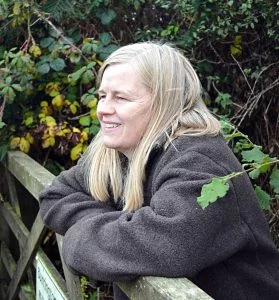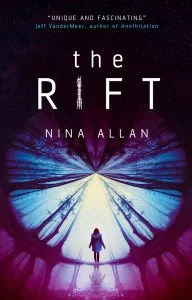 This is our second chance to interview author Nina Allan and this time around it is concerning her most recent work ‘The Rift’. For those who haven’t read the review, spoilers: we quite enjoyed it! Titan Books put this one out and they clearly picked a winner in this dark tale of two sisters who were separated and reunited under extremely mysterious circumstances.
This is our second chance to interview author Nina Allan and this time around it is concerning her most recent work ‘The Rift’. For those who haven’t read the review, spoilers: we quite enjoyed it! Titan Books put this one out and they clearly picked a winner in this dark tale of two sisters who were separated and reunited under extremely mysterious circumstances.
Science Fiction (SF): Nina, welcome back and thank you for taking the time to do a second interview with us. First off, could you explain to our readers who haven’t checked out the review or synopsis of the novel what ‘The Rift’ is about?
Nina Allan (NA): Thank you – it’s great to be back! ‘The Rift’ is the story of two sisters, Selena and Julie. When Julie disappears at the age of seventeen, her younger sister Selena is left behind to bear the loss, and to watch the disintegration of her family amidst the continuing strain and heartbreak of Julie’s absence. Twenty years later, Selena receives a phone call from a woman claiming to be Julie, and insisting that she has spent the past two decades on an alien planet. Selena is faced with a choice: to reject this woman as an impostor and everything she says as a sad delusion, or to believe her, and risk her own sanity and the loss of the world she previously accepted as her daily reality.
SF: Julie and Selena are the two main characters of the novel; can you share a bit of insight on these two sisters?
NA: It is Selena we get to know first, as the opening third of the novel is written from her point of view. I would say that Selena has the more grounded, pragmatic temperament. She grew up in Julie’s shadow, and so she has learned to be watchful, to listen and observe rather than rushing to action. Selena is a considerate, thinking individual, and my purpose in beginning the novel from her perspective was to give readers an anchor, a voice they felt they could trust. When we meet Julie in part two of the novel, our natural reaction – like Selena’s – is to be suspicious. But we soon learn that Julie is sensitive and gifted, more imaginative than her sister perhaps, but consequently more vulnerable to the terrors and paradoxes of everyday life. In the end, it is difficult to know who to believe, because both sisters are equally persuasive – which was precisely my intention in letting them each tell their own story. I wanted that element of doubt to survive to the end of the novel and beyond.
SF: Would you say that you relate more to Julie or Selena? Why?
NA: I very much wanted readers to relate to both sisters, to find sympathy for each, and my own feelings on that subject are no different. Selena is the stronger character, I think, but Julie is the more imaginative thinker. If one adheres to the old adage about characters in a novel each reflecting different aspects of their author’s personality and temperament, then I would probably say that Selena is the face I present to the world, but Julie is a more intimate reflection of who I am.
SF: Family is a central, if not the central theme of the story. Did the tale evolve into that or was that always your intention?
NA: Family stories are close to my heart – indeed they lie close to the heart of much of literature. I would say though that the family aspect did deepen and intensify as I began exploring the implications of what I was writing. ‘The Rift’ actually began life in my mind as a more pared down alien abduction story, but the more I wrote, the more I became interested in the peripheral characters, especially Selena and the sisters’ father, Ray. I never have cut-and-dried assumptions about where a piece of work might be going, because I find that kind of planned approach too restrictive. I prefer to start with a set of characters and a situation and see where everyone ends up.
 SF: What kind of research did you find yourself doing for ‘The Rift’?
SF: What kind of research did you find yourself doing for ‘The Rift’?
NA: I did visit most of the named locations in the novel, and spent most of a day wandering around Hatchmere Lake and the part of the Delamere Forest where Julie goes missing. A sense of place has always been central to me, and I like to gain a sense of familiarity with the landscapes I write about. The most intensive research I did was for ‘Franziska’s Journey’, the short essay Julie writes about Anna Anderson and the Grand Duchess Anastasia Romanov. I knew the background of this case very well, but not the minutiae. In the course of my reading, I discovered many details about Anna Anderson I had not previously known and became fascinated with her story all over again.
SF: Last we spoke you were finishing up a novella entitled ‘Maggots’. Can you tell us a bit about that Lovecraftian inspired tale?
NA: I’ve always enjoyed Lovecraft’s brand of cosmic horror – I think the grand sweep of his fiction shows a unique power, and the Cthulhu Mythos itself forms one of the key foundation stones of much of modern horror. It’s very possible to dislike Lovecraft, for all kinds of reasons, but if you have any interest in horror or weird fiction it’s impossible to ignore him! There’s some amazing writing going on right now in post-Lovecraftian horror – I particularly admire the work of Caitlin R. Kiernan, for example – but I tend to prefer those stories that draw on the Mythos for inspiration, rather than those that borrow from Lovecraft more directly. Quite simply, I wrote ‘Maggots’ because I wanted to try my hand at writing this kind of story. I’m happy to say it’s a piece I loved writing, from beginning to end.
SF: What drew you to working on ‘Maggots’? Again, it looks as if a family is involved, is that a central theme here as well?
NA: Interestingly, the main character of ‘Maggots’, a young man named Willy Randle, was originally a character in ‘The Rift’! In an earlier draft of the novel, the UFO group that Selena’s father becomes involved with playing a much bigger role, with Willy at the center of that part of the action. As the book evolved, I realized that the UFO people were one storyline too many, and so they were moved to the background. I loved Willy as a character though, so much so that I resolved to write him his own story in due course. ‘Maggots’ is that story, to which family is, again, absolutely central.
SF: With a venture into horror, do you feel that you may return to that in the future or stick with a slightly more science fiction base for your speculative fiction?
NA: I love horror – I love reading it, watching it, writing about it – and there’s rarely a time when I don’t have a horror project bubbling away on the back burner. My next novel – only recently completed – has a weird fiction vibe with some dark fairy tale elements. I also have a whole file of notes for a novel that ties in with ‘The Rift’, focusing on the Tristane storyline and that should deliver a sizeable portion of horror along the way. I suppose the answer to your question is that I enjoy both genres and it often feels natural for me to mix them. It probably won’t come as any surprise for readers to learn that one of my favorite films of all time is Ridley Scott’s ‘Alien’…
SF: When writing a novel, do you extensively plan it out or write what comes to you?
NA: There are times when I wish I were more of a planner – one of the more annoying side effects of my personal writing practice is that I tend to discard a lot of words, and I mean a lot. But I am definitely a pantser, for my sins, a habit that goes right back to my school days when I refused to write essay plans! For me, writing is a process of discovery: the theme, subject, and substance of a piece of writing is only fully discoverable in the writing, and a huge part of the excitement lies in that very palpable sense of surprise, of ending up in places you never imagined, and could not have imagined prior to setting out on that writing journey.
SF: As always, I’d like to close by asking what you might have in the works that you can share with us?
NA: My third novel is about a doll maker who sets out on his own journey of discovery, and I hope to be able to share more information about him in the near future. I’m also in the tentative early stages of planning something new, possibly the most definable science fictional work I’ve yet written, and loosely based around some of the ideas I was playing with in an earlier story, ‘Flying in the Face of God’. I’m at that exciting stage of trying things out, where anything seems possible!
